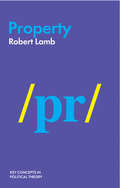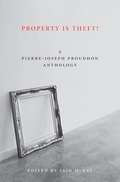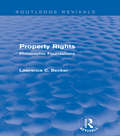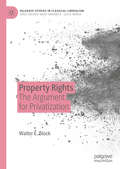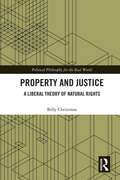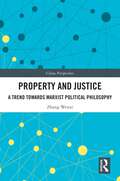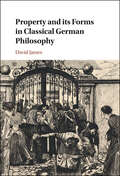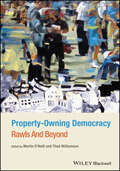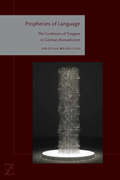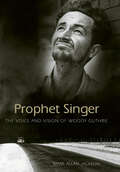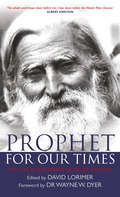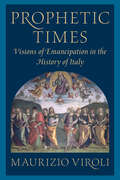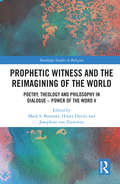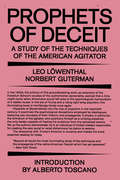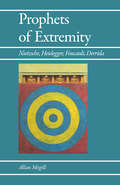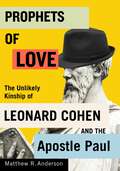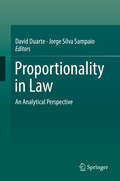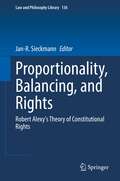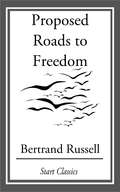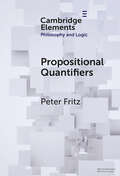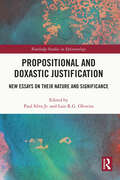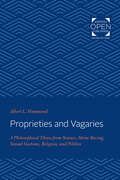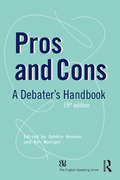- Table View
- List View
Property (Key Concepts in Political Theory #9)
by Robert LambFew political ideas are as divisive and controversial for some – and yet taken for granted by others – as the ownership of private property. For its defenders, private ownership is a fundamental right that protects individual freedom and ensures wider economic benefits for the community; for its critics, by contrast, property is institutionalised theft, responsible for lamentable levels of inequality and poverty. In this book, Robert Lamb explores philosophical arguments deployed to conceptualise, justify, and criticise private property ownership. He introduces the radical case against property advanced by anarchist and socialist writers, before analysing some of the most important and influential arguments in its favour. Lamb explains and assesses the various defences of property rights advanced by Locke, Hume, Hegel, J. S. Mill, and Nozick. He then shows how theorists such as John Rawls and his followers encourage us to rethink the very nature of ownership in a democratic society. This engaging synthesis of historical and contemporary theories of property will be essential reading for students and scholars of political philosophy.
Property Is Theft!
by Pierre-Joseph Proudhon Iain Mckay"An indispensable source book for anyone interested in Proudhon's ideas and the origins of the socialist and anarchist movements in nineteenth-century Europe."-Robert Graham, editor of Anarchism: A Documentary History of Libertarian Ideas"Iain McKay's introduction offers a sure-footed guide through the misconceptions surrounding Proudhon's thought."-Mark Leier, author of Bakunin: The Creative PassionMore influential than Karl Marx during his lifetime, Pierre-Joseph Proudon's work has long been out of print or unavailable in English. Iain McKay's comprehensive collection is a much-needed and timely historical corrective.Iain McKay is the editor of An Anarchist FAQ.
Property Rights: Philosophic Foundations (Routledge Revivals)
by Lawrence C. BeckerProperty Rights: Philosophic Foundations, first published in 1977, comprehensively examines the general justifications for systems of private property rights, and discusses with great clarity the major arguments as to the rights and responsibilities of property ownership. In particular, the arguments that hold that there are natural rights derived from first occupancy, labour, utility, liberty and virtue are considered, as are the standard anti-property arguments based on disutility, virtue and inequality, and the belief that justice in distribution must take precedence over private ownership. Lawrence Becker goes on to contend that there are four sound lines of argument for private property that, together with what is sound in the anti-property arguments, must be co-ordinated to form the foundations of a new theory. He therefore expounds a concise but sophisticated theory of property that is relevant to the modern world, and concludes by indicating some of the implications of his theory.
Property Rights: The Argument for Privatization (Palgrave Studies in Classical Liberalism)
by Walter E. BlockIn this timely book, Walter E. Block uses classical liberal theory to defend private property rights. Looking at how free enterprise, capitalism and libertarianism are cornerstones of economically prosperous civilizations, Block highlights why private property rights are crucial. Discussing philosophy, libertarian property rights theory, reparations and other property rights issues, this volume is of interest to academics, students, journalists and all those interested in this integral aspect of political economic philosophy.
Property and Justice: A Liberal Theory of Natural Rights (Political Philosophy for the Real World)
by Billy ChristmasThis book gives an account of a full spectrum of property rights and their relationship to individual liberty. It shows that a purely deontological approach to justice can deal with the most complex questions regarding the property system. Moreover, the author considers the economic, ecological, and technological complexities of our real-world property systems. The result is a more conceptually sound account of natural rights and the property system they demand. If we think that liberty should be at the centre of justice, what does that mean for the property system? Economists and lawyers widely agree that a property system must be composed of many different types of property: the kind of private ownership one has over one’s person and immediate possessions, as well as the kinds of common ownership we each have in our local streets, as well as many more. However, theories of property and justice have not given anything approaching an adequate account of the relationship between liberty and any other form of property other than private ownership. It is often thought that a basic commitment to liberty cannot really tell us how to arrange the major complexities of the property system, which diverge from simple private ownership. Property and Justice demonstrates how philosophical rigour coupled with interdisciplinary engagement enables us to think clearly about how to deal with real-world problems. It will be of interest to political philosophers, political theorists, and legal theorists working on property rights and justice.
Property and Justice: A Trend Towards Marxist Political Philosophy (China Perspectives)
by Zhang WenxiThis book attempts to answer the question “what on earth is the Marxist political philosophy?” The author discusses Karl Marx's vision of the good life and the good society, focusing in particular on the interrelationship between property and justice. Strictly speaking, the subject of the present book should not be placed within an a priori conceptual framework, which essentially focuses on academic notions of the good society, good government and justice. However, for the purposes of this book, Marxist political philosophy, namely communism, is already embodied in two aspects. This book argues that it is the noisy and confusing modern political philosophy that obscures the actualisation of human nature unfolded by the Marxist political philosophy before us. The book will be essential reading for students and scholars of philosophy, Marxism, Chinese studies and Chinese Marxist philosophy.
Property and Political Order in Africa
by Catherine BooneIn sub-Saharan Africa, property relationships around land and access to natural resources vary across localities, districts and farming regions. These differences produce patterned variations in relationships between individuals, communities and the state. This book captures these patterns in an analysis of structure and variation in rural land tenure regimes. In most farming areas, state authority is deeply embedded in land regimes, drawing farmers, ethnic insiders and outsiders, lineages, villages and communities into direct and indirect relationships with political authorities at different levels of the state apparatus. The analysis shows how property institutions - institutions that define political authority and hierarchy around land - shape dynamics of great interest to scholars of politics, including the dynamics of land-related competition and conflict, territorial conflict, patron-client relations, electoral cleavage and mobilization, ethnic politics, rural rebellion, and the localization and 'nationalization' of political competition.
Property and its Forms in Classical German Philosophy
by David JamesThe theme of property is directly relevant to some of the most divisive social and political issues today, such as wealth inequality and the question of whether governments should limit it by introducing measures that restrict the right to property. Yet what is property? And when seeking to answer this question, do we tend to identify the concept with just one dominant historical form of property? In this book, David James reconstructs the theories of property developed by four key figures in classical German philosophy - Kant, Fichte, Hegel and Marx. He argues that although their theories of property are different, the concept of social recognition plays a crucial role in all of them, and assesses these philosophers' arguments for the specific forms of property they claim should exist in a society that is genuinely committed to the idea of freedom.
Property-Owning Democracy: Rawls and Beyond
by Martin O'Neill Thad WilliamsonProperty-Owning Democracy: Rawls and Beyond features a collection of original essays that represent the first extended treatment of political philosopher John Rawls' idea of a property-owning democracy. Offers new and essential insights into Rawls's idea of "property-owning democracy" Addresses the proposed political and economic institutions and policies which Rawls's theory would require Considers radical alternatives to existing forms of capitalism Provides a major contribution to debates among progressive policymakers and activists about the programmatic direction progressive politics should take in the near future
Prophecies of Language: The Confusion of Tongues in German Romanticism (Lit Z)
by Kristina MendicinoThe scenes of Babel and Pentecost, the original confusion of tongues and their redemption through translation, haunt German Romanticism and Idealism. This book begins by retracing the ways in which the task of translation, so crucial to Romantic writing, is repeatedly tied to prophecy, not in the sense of telling future events, but in the sense of speaking in the place of another—most often unbeknownst to the speaker herself. In prophetic speech, the confusion of tongues repeats, each time anew, as language takes place unpredictably in more than one voice and more than one tongue at once. Mendicino argues that the relation between translation and prophecy drawn by German Romantic writers fundamentally changes the way we must approach this so-called “Age of Translation.” Whereas major studies of the period have taken as their point of departure the opposition of the familiar and the foreign, Mendicino suggests that Romantic writing provokes the questions: how could one read a language that is not one? And what would such a polyvocal, polyglot language, have to say about philology—both for the Romantics, whose translation projects are most intimately related to their philological preoccupations, and for us? In Prophecies of Language, these questions are pursued through readings of major texts by G.W.F. Hegel, Wilhelm von Humboldt, Friedrich Schlegel, and Friedrich Hölderlin. These readings show how, when one questions the presupposition of works composed by individual authors in one tongue, these texts disclose more than a monoglot reading yields, namely the “plus” of their linguistic plurality. From such a surplus, each chapter goes on to advocate for a philology that, in and through an inclination toward language, takes neither its unity nor its structure for granted but allows itself to be most profoundly affected, addressed—and afflicted—by it.
Prophecy without Contempt: Religious Discourse in the Public Square
by Cathleen KavenyThe culture wars have as much to do with rhetorical style as moral substance. Cathleen Kaveny focuses on a powerful stream of religious discourse in American political speech: the Biblical rhetoric of prophetic indictment. It can be strong medicine against threats to the body politic, she shows, but used injudiciously it does more harm than good.
Prophet Singer: The Voice and Vision of Woody Guthrie (American Made Music Series)
by Mark Allan JacksonProphet Singer: The Voice and Vision of Woody Guthrie examines the cultural and political significance of lyrics by beloved songwriter and activist Woodrow Wilson “Woody” Guthrie. The text traces how Guthrie documented the history of America's poor and disadvantaged through lyrics about topics as diverse as the Dust Bowl and the poll tax. Divided into chapters covering specific historical topics such as race relations and lynchings, famous outlaws, the Great Depression, and unions, the book takes an in-depth look at how Guthrie manipulated his lyrics to explore pressing issues and to bring greater political and economic awareness to the common people. Incorporating the best of both historical and literary perspectives, Mark Allan Jackson references primary sources including interviews, recordings, drawings, and writings. He includes a variety of materials from the Smithsonian Institution, the Library of Congress, and the Woody Guthrie Archives. Many of these have never before been widely available. The result provides new insights into one of America's most intriguing icons. Prophet Singer offers an analysis of the creative impulse behind and ideals expressed in Guthrie's song lyrics. Details from the artist's personal life as well as his interactions with political and artistic movements from the first half of the twentieth century afford readers the opportunity to understand how Guthrie's deepest beliefs influenced and found voice in the lyrics that are now known and loved by millions.
Prophet for Our Times: The Life & Teachings of Peter Deunov
by David LorimerPeter Deunov (Beinsa Dounov), who lived in Bulgaria from 1864 to 1944, was a great and inspired teacher of the Perennial Wisdom - the essential thread of truth running through all the major world religions. He was an extraordinary man who at once embodied great simplicity and tremendous profundity. All those who knew him testified to the fact that he inspired inner excellence in very ordinary people. His teachings are both direct and clear, and will speak to everybody whatever their creed. Essentially they give a prescription for living in harmony with others, with the Earth and with the Divine.Prophet for Our Times is being brought back into print following Dr. Wayne D. Dyer's desire to share the work of the philosopher who greatly influenced him. This selection of teachings makes ideal reading for anyone on the spiritual path. It explains simply and directly how to find love, wisdom, truth, justice, harmony, and balance in life. It also gives advice on techniques of prayer, meditation, and visualization, and valuable information on right diet and exercise to assist inner focus and clarity. Peter Deunov's wise words will speak to everyone, and will have special appeal to those searching for an authentic spiritual tradition of Western origin.
Prophetic Times: Visions of Emancipation in the History of Italy
by Maurizio ViroliThroughout Italy's history, prophetic voices-poets, painters, philosophers-have bolstered the struggle for social and political emancipation. These voices denounced the vices of compatriots and urged them toward redemption. They gave meaning to suffering, helping to prevent moral surrender; they provided support, with pathos and anger, which set into motion the moral imagination, culminating in redemption and freedom. While the fascist regime attempted to enlist Mazzini and the prophets of the Risorgimento in support of its ideology, the most perceptive anti-fascist intellectual and political leaders composed eloquent prophetic pages to sustain the resistance against the totalitarian regime. By the end of the 1960s, no prophet of social emancipation has been able to move the consciences of the Italians. In this Italian story, then, is our story, the world's story, inspiration for social and political emancipation everywhere.
Prophetic Witness and the Reimagining of the World: Poetry, Theology and Philosophy in Dialogue- Power of the Word V (Routledge Studies in Religion)
by Mark S. Burrows Hilary Davies Josephine Von ZitzewitzThis book explores the prophetic characteristics of literature, particularly poetry, that seek to reimagine the world in which it is written. Using theological and philosophical insights it charts the relentless impulse of literature to propose alternative visions, practicable or utopian, and point toward possibilities of renewal and change. Drawing from each of the three main Abrahamic religions, as well as Greek and Latin classics, an international group of scholars utilise a diverse range of analytical and interpretive methods to draw out the prophetic voice in poetry. Looking at the writings of figures like T. S. Elliot, Blake, Wittgenstein and Isaiah, the theme of the prophetic is shown to be of timely importance given the current state of geo-political challenges and uncertainties and offers a much-needed critical discussion of these broad cultural questions. This collection of essays offers readers an insight into the constructive power of literature. As such, it will be of great interest to scholars working in Religion and the Arts, Religious Studies, Theology and Aesthetics.
Prophets of Deceit: A Study of the Techniques of the American Agitator (Paperbounds Ser. #No. Pb-8)
by Norbert Guterman Leo LowenthalHow authoritarian and racist discourse functionsA classic book that analyzes and defines media appeals specific to American pro-fascist and anti-Semite agitators of the 1940s, such as the application of psychosocial manipulation for political ends. The book details psychological deceits that idealogues or authoritarians commonly used. The techniques are grouped under the headings "Discontent", "The Opponent", "The Movement" and "The Leader". The authors demonstrate repetitive patterns commonly utilized, such as turning unfocused social discontent towards a targeted enemy. The agitator positions himself as a unifying presence: he is the ideal, the only leader capable of freeing his audience from the perceived enemy. Yet, as the authors demonstrate, he is a shallow person who creates social or racial disharmony, thereby reinforcing that his leadership is needed. The authors believed fascist tendencies in America were at an early stage in the 1940s, but warned a time might come when Americans could and would be "susceptible to ... [the] psychological manipulation" of a rabble rouser. A book once again relevant in the Trump era, as made clear by Alberto Toscano's new introduction.
Prophets of Extremity: Nietzsche, Heidegger, Foucault, Derrida
by Allan MegillIn this book, the author presents an interpretation of four thinkers: Nietzsche, Heidegger, Foucault, and Derrida. In an attempt to place these thinkers within the wider context of the crisis-oriented modernism and postmodernism that have been the source of much of what is most original and creative in twentieth-century art and thought.
Prophets of Love: The Unlikely Kinship of Leonard Cohen and the Apostle Paul (Advancing Studies in Religion #15)
by Matthew R. AndersonLeonard Cohen and the Apostle Paul might be imagined as brothers with wildly different characters but a strong family resemblance. Paul, the elder sibling, was awkward, abrasive, and zealous. Leonard, the successful younger brother, was a smooth-talking romantic, prone to addiction and depression. Paul died a martyr, not knowing his words would have any effect on the world. Leonard could see his canonization within his lifetime. Yet each became a prophet in his own time, and a poet for the ages.In Prophets of Love Matthew Anderson traces surprising connections between two Jewish thinkers separated by millennia. He explores Leonard's and Paul’s mysticism, their Judaism, their fascination with Jesus, their countercultural perspectives on sex, their ideas about love, and how they each embodied being men. Anderson considers their ambiguous relationships with women, on whom they depended and from whom they often profited, as well as how their legacies continue to evolve and be re-interpreted. This book emphasizes that Paul was first and foremost a Jew, and never rejected his Judaism. At the same time, it sheds new light on the biblical worldviews and language underlying and inspiring every line of Cohen’s poetry.Prophets of Love alters our views of both Leonard Cohen and the Apostle Paul, re-introducing us to two poetic prophets of divine and human love.
Proportionality in Law: An Analytical Perspective
by David Duarte Jorge Silva SampaioThis book addresses the principle of proportionality, which is currently one of the most important instruments of judicial review, from both analytical and theory of law perspectives. As such, the analysis provided is far more comprehensive and can be applied to all areas of law, not just constitutional law. On the one hand, the volume offers a broad perspective on several aspects related to proportionality, such as its structure, the balancing methodology and the distinction between rules and principles. On the other, it provides an innovative, normativist and analytical approach to proportionality, helping readers understand its structure and behaviour.
Proportionality, Balancing, and Rights: Robert Alexy's Theory of Constitutional Rights (Law and Philosophy Library #136)
by Jan-R. SieckmannThe book focuses on Robert Alexy’s theory of constitutional rights. Alexy systematically presented the theory in his seminal book “Theorie der Grundrechte” (1985; Engl. translation “Theory of Constitutional Rights, 2002) and continued to develop it in numerous subsequent articles. Arguably still the most influential theory of constitutional rights, it has found widespread academic support, as well as recognition in several constitutional jurisdictions. On the other hand, it has also been the object of considerable criticism. The aim of this book is to outline the central aspects of Alexy’s theory as he sees them, and to further develop the principles of constitutional, fundamental, and human rights by applying a constructive criticism of his theory.
Proposed Roads to Freedom
by Bertrand RussellBertrand Russell's critical accounts of Socialism, Anarchism, and Syndicalism are well worth careful reading. He knows his subject and sees with clear vision the defects in these "Proposed Roads to Freedom."
Propositional Quantifiers (Elements in Philosophy and Logic)
by Peter FritzPropositional quantifiers are quantifiers binding proposition letters, understood as variables. This Element introduces propositional quantifiers and explains why they are especially interesting in the context of propositional modal logics. It surveys the main results on propositionally quantified modal logics which have been obtained in the literature, presents a number of open questions, and provides examples of applications of such logics to philosophical problems.
Propositional and Doxastic Justification: New Essays on Their Nature and Significance (Routledge Studies in Epistemology)
by Paul Silva Luis R.G. OliveiraThis volume features original essays that advance debates on propositional and doxastic justification and explore how these debates shape and are shaped by a range of established and emerging topics in contemporary epistemology. This is the first book-length project devoted to the distinction between propositional and doxastic justification. Notably, the contributors cover the relationship between propositional and doxastic justification and group belief, credence, commitment, suspension, faith, and hope. They also consider state-of-the-art work on knowledge-first approaches to justification, hinge-epistemology, moral and practical reasons for belief, epistemic normativity, and applications of formal epistemology to traditional epistemological disputes. Finally, the contributors promise to reinvigorate old epistemological debates on coherentism, externalism, internalism, and phenomenal conservatism. Propositional and Doxastic Justification will be of interest to researchers and advanced students working in epistemology, metaethics, and normativity.
Proprieties and Vagaries: A Philosophical Thesis from Science, Horse Racing, Sexual Customs, Religion, and Politics
by Albert L HammondOriginally published in 1961. A constant influence on human action is that of proprieties, personal and social. These attitudes and traditions defining what is proper are largely logical in origin, but chance has a way of upsetting them. Even theory, which is part of human action, is subject to this influence. Dr. Hammond takes a novel approach to this philosophical theme. His topics of discussion include perception, the role of symbols in poetry and science, the definition of good and good use in language, space and the motion of the earth, the psychology of love, attitudes toward gambling, and a defense of horse racing. This unorthodox approach results in an exceptionally imaginative and thought-provoking book as well as a strong defense of deontology.
Pros and Cons: A Debaters Handbook
by Debbie Newman Ben WoolgarPros and Cons: A Debaters Handbook offers a unique and invaluable guide to the arguments both for and against over 140 current controversies and global issues. Since it was first published in 1896 the handbook has been regularly updated and this nineteenth edition includes new entries on topics such as the right to possess nuclear weapons, the bailing out of failing industries, the protection of indigenous languages and the torture of suspected terrorists. <P><P> Equal coverage is given to both sides of each debate in a dual column format which allows for easy comparison. Each entry also includes a list of related topics and suggestions for possible motions. <P><P> The introductory essay describes debating technique, covering the rules, structure and type of debate, and offering tips on how to become a successful speaker. The book is then divided into eight thematic sections, where specific subjects are covered individually.
